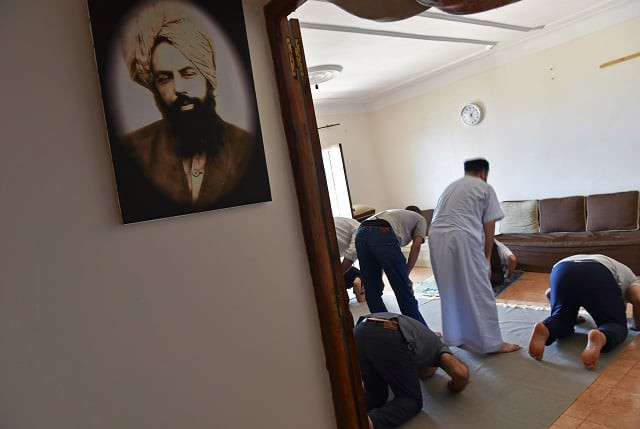Algeria's Ahmadis forced to worship behind closed doors
Islam is the state religion in Algeria, where Sunni Muslims make up the majority

Members of Algeria's small Ahmadi community pray at a house in Tilpasi, west of Algiers. PHOTO: AFP
Abderahmane, a 42-year-old trader from Kabylie in northern Algeria, joined the reformist Islamic movement after years as an ultra-conservative Salafist. People he once called friends reported him to the local imam, who publicly denounced him as an unbeliever. The imam went on to urge worshippers not to let their children play with Ahmadi children.
"My sister's engagement was cancelled because her fiance was told I was an unbeliever," Abderahmane said, still wearing a well-trimmed beard, a long cotton shirt, and three-quarter-length trousers - the garb of his former life as a Salafist.
While Ahmadis consider themselves to be Muslims, the Organisation of Islamic Cooperation - of which Algeria is a member - declared in 1973 that the movement was not linked to the Muslim faith. Nonetheless, the faith's strong missionary drive has gained it an estimated 10 million members in 190 countries around the world.
The movement didn't begin spreading in Algeria until 2007, when an Ahmadi satellite television channel reached the north African country. After that, they worshipped freely, if discreetly, for a decade. Few in Algeria had even heard of Ahmadism until last year, when the government crackdown began.
Ahmadi leader Mohamed Fali, a 44-year-old shopkeeper, was arrested in June 2016 along with his deputy, shortly after applying to register a charity. Police searched their homes and confiscated their passports.
Seven years on, perpetrators of attack on Ahmadi worship places still at large
Since then, Fadi says 286 out of Algeria's roughly two thousand Ahmadis have been arrested. All but three have been handed jail terms, ranging from a three-month suspended sentence to four years. The other three received fines. Most were convicted of breaking right to assembly laws - but their lawyers say they have been persecuted simply for their faith.
Islam is the state religion in Algeria, where Sunni Muslims make up the majority. Freedom of religion is guaranteed by law, but preachers and places of worship must be licensed by the government.
In July, Algeria's Religious Affairs Minister Mohamed Aissa told journalists the Ahmadis were involved in a plot by Israel - where the community are allowed to worship openly, with a big mosque in the city of Haifa and a television channel - to destabilise the country.



















COMMENTS
Comments are moderated and generally will be posted if they are on-topic and not abusive.
For more information, please see our Comments FAQ